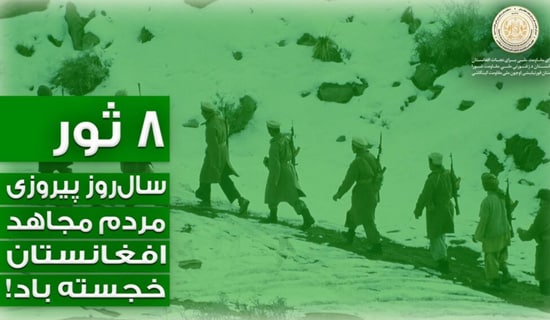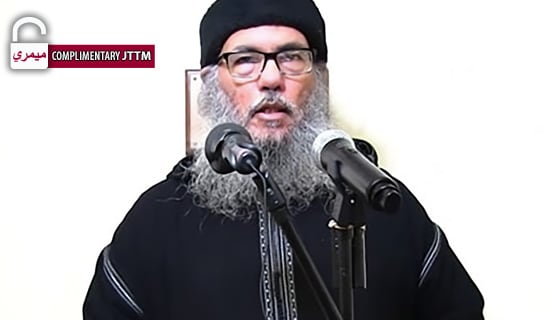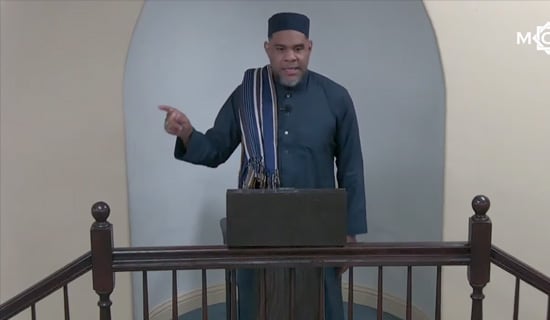Against the backdrop of the spreading pro-Palestinian protests on university campuses across the U.S., Lebanese journalist Hussam Itani, a prominent member of the editorial board of the Saudi website Al-Majalla, expressed his doubts about the protests' longevity and disputed the comparisons between these protests and the anti-Vietnam War protests on American campuses in the 1960s and early 1970s. against the Vietnam War. Explaining that the antiwar protestors 50 years ago demanded that the U.S. stop killing civilians and withdraw from Vietnam, he stressed that today's pro-Palestinian protests reflect support for Hamas and that the protestors are chanting slogans without indicating any clear vision for the future of the Palestinian people.

Columbia University protestor holds up his phone showing the Hamas logo. Source: Twitter.com/SafaaAlNuaimi, April 22, 2024.
Atini argued that the protests will not influence the Biden administration to change its policy, and that the praise lavished on the protestors can be compared to the praise voiced by French intellectual Michel Foucault at anti-Shah protestors in Iran in the late 1970s. He added that the latter ended with the persecution and execution of the protestors themselves.
Below is a translation of excerpts from Atini's article:
"Before we get too excited over the student demonstrations at the American universities and their calls for a ceasefire in Gaza and for the universities to cut all ties with Israel, we must first briefly consider the impression that can be left by a too-hasty glance at events, people, and periods in history.
SUPPORT OUR WORK

"The widespread comparison made today between the students' activities at American universities – including some of the most important centers of academia – and the protests against the Vietnam War in the mid-1960s is undeniably tempting. However, it lacks precision and context, and therefore it cannot meaningfully predict the outcome of this current student activity.
"In contrast to the demonstrators of the 1960s, who came from the heart of American society with their ethnic and social affiliations in tow, the majority of today's demonstrators are new immigrants. In addition, only a minority of the young people in the '60s supported the Viet Cong, while the majority focused their pressure on the need to stop the killing of civilians and to withdraw from Vietnam. Meanwhile, [today's protestors] have adopted a stance that approaches open support for Hamas, and that [reflects] an unclear approach regarding the future of Palestine and the Palestinians – that is, except for slogans such as 'liberty,' 'independence,' and 'stop the genocide.'
"The big difference [between the two types of demonstrations] lies in what the Vietnam War represented with respect to the American domestic front: the death of tens of thousands of young men... and the ramifications of this for the political, economic, and even cultural structure in the U.S. Compare this with the battle being waged by two foreign forces [i.e. Israel and Hamas] which may not be of much interest to American citizens in an election year, in light of the acute polarization between the two great political forces: the Democratic Party and its rival Republican Party...
"If we want to examine similar cases of student [protest] movements, we can go back to [more] examples from the last century, such as the May 1968 revolution at universities in France and led to the resignation of [French president] Charles de Gaulle, but did not transform the French political regime. There were also the student protests in Lebanon during the first half of the 1970s, which ultimately contributed to laying the groundwork for the destructive civil war [there].
"In the same context, the praise for the student demonstrations at the American universities is most of all reminiscent of the praise heaped upon Iran's [Islamic] Revolution by the French philosopher Michel Foucault... who believed [at the time] that the protest against the regime of the shah included 'political spirituality'[1] that allowed millions of Iranians to challenge the oppression and the tyranny. Foucault qualified his positions with numerous clarifications and explanations until he was [finally] compelled to see how the [Iranian] 'political spirituality' persecuted its own people and its supporters, executed them, threw them into prison, or banished them from the country.
"The belief held by Foucault, who twice visited Iran, i.e. that the Iranian clerics were motivated by spirituality that could become a significant political influence and that they were expressing the fierce desires of the majority of the Iranian public that opposed what the shah represented, is similar to the wishful thinking that a few thousand students at the American universities will bring about a change in the Biden administration's position vis-à-vis Israel...
"In other words, in the discourse about 'the courage' of the students, those who are striking, and the demonstrators at Columbia, Yale, and other universities, and their challenge to the academic and political 'establishments' and their powerful reach, there is no consideration of the influence that this activity will have on the war in Gaza and on the whole of the conflict in Palestine...
"Foucault was one of the most important intellectuals and philosophers in 20th-century Europe. He was by no means naïve, and yet, according to many of his readers and disciples, it appears that his position on Iran's revolution reflected his desire to see something that would shatter the prevalent ideas of his time, as he did in his writings. Likewise, [today], great hopes are pinned on something that should be pondered most seriously before shouting it from the rooftops."[2]
[1] In 1978-79, Foucault published a series of articles about the rise of Ayatollah Ruhollah Khomeini and Iran's Islamic Revolution. In it, he expressed his awe at the prominence of spirituality in Khomeini's leadership and in the Islamic regime, commented on the feeling that this must have given the protestors in the streets, and underlined how there is no comparable experience in Europe.
[2] Majalla.com, April 24, 2024.




